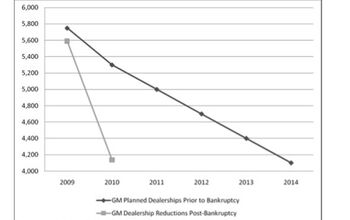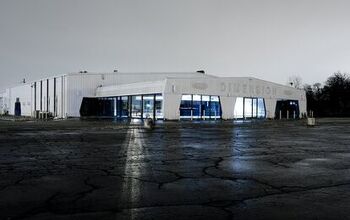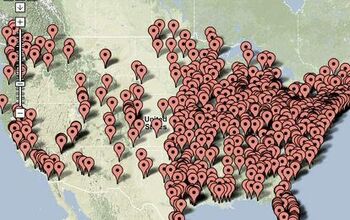Editorial: GM/Chrysler Dealer Cull Explained. Ish.
The automotive retail landscape has been dramatically reshaped as both Chrysler and GM together have terminated almost 2,000 dealers as part of their on-going restructuring efforts. They were able to use the bankruptcy process to circumvent strong state franchise laws to shed dealers. At times there appeared to be no rhyme or reason to the selection process, leaving both dealers and consumers perplexed. Last week, as new details and documents surfaced on thetruthaboutcars.com on why certain GM dealership agreements would not be renewed in 2010, Automotive Traveler took an in-depth look at the closing process.
Over the past three weeks, both GM and Chrysler informed many of their dealers that they are now redundant as the restructure. While it was expected that many small rural dealers would be among those cut loose, in Chrysler’s case, many dealers that sold just one of their three (Chrysler, Dodge, and Jeep) brands were shut down. In some cases this was unexpected given that some dealerships were in major metro areas and boasted modern facilities. The reason given? That the company was “overdealered” meaning that there were too many dealers and it was impacting all dealers profitability.
In the case of the reasons why that certain Chrysler dealers were terminated, it appears that five criteria were evaluated.
Financial Viability
Dealership Upkeep and Appearance
Competing Brands at the Same Location
Number of Units Sold
Customer Satisfaction Index Scores
Chrysler dealers who might question why they were targeted for elimination probably need only answer the following seven questions:
Did you try and combine your store with a Dodge or Jeep dealer (or sell out to them) if a standalone dealership?
Did you update your showroom and service facility to the franchise-specific plan?
Did you consistently exceed your quota, and strive to increase your market share, even at the expense of gross margins?
Did you support the manufacturer, and exceed your stocking requirements by taking on extra inventory?
Are you financially viable, and consistently profitable (while trying not to hide any excess profits)?
If you have a competing brand, is it at least in a separate location/showroom/facility?
And are you selling more used product than new?
If the dealer answered NO to questions one thru six and YES to question seven, then each dealer can surmise why they were eliminated.
Over at GM, the problem is more complicated given that the Pontiac brand is being eliminated after GM’s recent efforts to build its Buick-GMC-Pontiac sales channel, and that GM is in the process of selling its Hummer, Saturn, and Saab brands. GM dealers will be evaluated based on four criteria to judge their viability. These criteria include:
Profitability
Capitalization
Customer service
Sales effectiveness.
To be part of the new, post-bankruptcy GM, these dealers have to perform well in all four categories.
For those dealers being eliminated, GM is offering some dealerships from $20,000 to $1 million to wind down their businesses over the next 17 months, the payment based on factors such as brands carried, regional sales rank, and current inventory.
But this payment comes with a cost; if the dealer accepts the payment, GM will not buy unsold inventory, the dealer must agree not to sue GM until their franchise agreement expires, the terminated dealers also will not be allowed to order new cars from GM, and they must stay in business until January, 2010.
And what might be the most onerous condition, a gag order that prohibits terminated dealers to talk to anyone other than its employees without GM’s permission.
Some GM dealers are not accepting the decision without a fight. Some are appealing individual decisions, seeking reinstatement, while others have gone public.
No one has been as public than Gretchen Carlson, host of “Fox and Friends” on the Fox News Channel. Her parent’s dealership, Main Motors in Anoka, Minnesota has been slated to be closed. On June 9 she appeared on “The Glenn Beck Program”, also on FNC, to plead their plight.
To respond, GM had Susan Docherty, its North America Vice President Buick-Pontiac-GMC appear on “Fox and Friends” on June 12 to respond to Ms. Carlson’s charges. The exchange wasn’t pretty, calling into question just how fair and balanced Ms. Carlson and Fox News Channel are, who along with the Fox Business Channel has taken a very vocal and pronounced anti-bailout stance with regard to the auto manufacturers, including saying that the selection of some dealership closings was politically motivated.
[For additional details, including seven supporting videos, read the entire report on Automotive Traveler]
More by Jim Brennan
Latest Car Reviews
Read moreLatest Product Reviews
Read moreRecent Comments
- Lou_BC Maybe if I ever buy a new car or CUV
- Lou_BC How about telling China and Mexico, we'll accept 1 EV for every illegal you take off our hands ;)
- Analoggrotto The original Tassos was likely conceived in one of these.
- Lorenzo The unspoken killer is that batteries can't be repaired after a fender-bender and the cars are totaled by insurance companies. Very quickly, insurance premiums will be bigger than the the monthly payment, killing all sales. People will be snapping up all the clunkers Tim Healey can find.
- Lorenzo Massachusetts - with the start/finish line at the tip of Cape Cod.
































Comments
Join the conversation